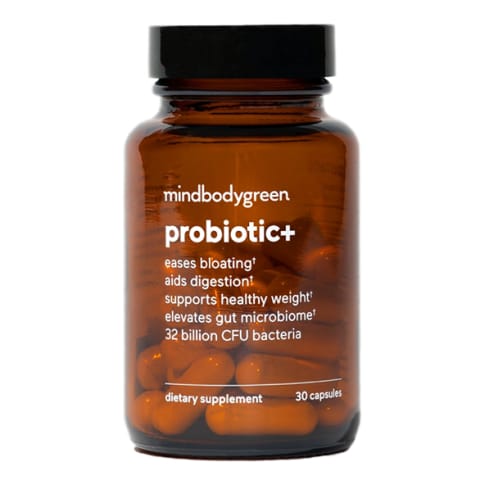Advertisement
The Gut Microbiome Benefits Of Intermittent Fasting You Need To Know, From A Functional Medicine Practitioner


Ashley Jordan Ferira, Ph.D., RDN is Vice President of Scientific Affairs at mindbodygreen. She received her bachelor's degree in Biological Basis of Behavior from the University of Pennsylvania and Ph.D. in Foods and Nutrition from the University of Georgia.

It's not a secret that your gut holds an incredible amount of power over your health. In fact, suboptimal gut health is often the underlying trigger for a variety of health issues that I see my patients struggle with in my telehealth functional medicine clinic.
And if your gut health is less than optimal, chances are you've tried almost every tool to improve it, like sipping bone broth or prioritizing a high-quality probiotic.* But there's one tool you may not have considered.
Fasting is one of the most underrated and overlooked tools for revamping your gut and unlocking a healthy microbiome. When you fast, you are giving your gut a much-needed rest—a gastrointestinal siesta, if you will. It's something I cover extensively in my latest book, Intuitive Fasting. But how can something as simple as taking a break from food actually work? Let's dive in.
Why I'm a fan of giving your digestion a break.
Digestion uses a surprising amount of energy—10% of our body's total energy, in fact. Everything from chewing to saliva production to swallowing takes energy. That's not even counting the production of stomach acid and the various enzymes and hormones released from your pancreas to break down macronutrients and regulate hunger signals.
And it doesn't stop there. Your body also produces water, enzymes, base salts, mucus, and bile that total about 2 gallons of liquid—all of which enter the large intestine. While all this is happening, your gastrointestinal tract has to churn the food and make rhythmic muscular contractions to push the food through your intestines, so the particles can absorb into your bloodstream and distribute throughout your body.
Are you tired yet? Many of you probably didn't realize what you were asking of your body when you had it digesting all hours of the day and night. No wonder your gut may be a little exhausted and exasperated!
Why fasting can help support gut health.
Beyond giving your gut a nice little rest, when you get down to it, fasting has an overwhelming ability to truly support your gut—and overall health—at a cellular level. Here's how:
Gut microbiome regulation.
The gut microbiome has its own circadian rhythm1, and just like the ocean tides, different colonies of bacteria ebb and flow throughout the day. Certain populations of bacteria increase depending on whether we are awake, sleeping, or eating food.
This GI microbiome circadian cycle is normal and repeats itself every day, but it can be disrupted if we are constantly eating. Periods of fasting can help reset your microbiome's natural rhythm throughout the day.
Enhanced gut-metabolism connection.
Underlying metabolic health issues often start in the gut. For example, some research suggests that those who are overweight tend to have lower gut microbiome diversity and gut imbalance2.
However, as some research indicates (including this study with mice), fasting may be able to reduce the absorption of specific bacterial endotoxins, which have been linked to an increased risk for obesity and reduced insulin sensitivity.
The takeaway.
The good news is that your gut microbiome starts to respond to fasting and food changes extremely quickly. You might expect it to take weeks or years to change the makeup of your GI microbiota, but research shows that it can start to happen within a few hours and you may even observe significant changes in just a few days of fasting.
By establishing a set fasting window, you're also giving your gut a set amount of rest hours. To learn more about resetting your gut and finding a fasting practice that works for you, check out my book, Intuitive Fasting.
Watch Next
Enjoy some of our favorite clips from classes
Enjoy some of our favorite clips from classes
What Is Meditation?
Mindfulness/Spirituality | Light Watkins
Box Breathing
Mindfulness/Spirituality | Gwen Dittmar
What Breathwork Can Address
Mindfulness/Spirituality | Gwen Dittmar
The 8 Limbs of Yoga - What is Asana?
Yoga | Caley Alyssa
Two Standing Postures to Open Up Tight Hips
Yoga | Caley Alyssa
How Plants Can Optimize Athletic Performance
Nutrition | Rich Roll
What to Eat Before a Workout
Nutrition | Rich Roll
How Ayurveda Helps Us Navigate Modern Life
Nutrition | Sahara Rose
Messages About Love & Relationships
Love & Relationships | Esther Perel
Love Languages
Love & Relationships | Esther Perel
What Is Meditation?
Box Breathing
What Breathwork Can Address
The 8 Limbs of Yoga - What is Asana?
Two Standing Postures to Open Up Tight Hips
How Plants Can Optimize Athletic Performance
What to Eat Before a Workout
How Ayurveda Helps Us Navigate Modern Life
Messages About Love & Relationships
Love Languages
Advertisement

This Type Of Fat Is Vital For Women's Health — Are You Getting Enough?
Molly Knudsen, M.S., RDN

New Study Confirms The 3 Habits That Age Your Brain Faster
Molly Knudsen, M.S., RDN

This Type Of Fat Is Vital For Women's Health — Are You Getting Enough?
Molly Knudsen, M.S., RDN















